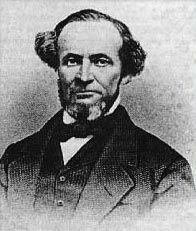
Bloodgood Cutter
Encyclopedia

New York
New York is a state in the Northeastern region of the United States. It is the nation's third most populous state. New York is bordered by New Jersey and Pennsylvania to the south, and by Connecticut, Massachusetts and Vermont to the east...
.
Cutter's parentage is not clear, but he was related to the Haviland family and later inherited or bought much of their land. He had a limited education, mainly from reading the bible
Bible
The Bible refers to any one of the collections of the primary religious texts of Judaism and Christianity. There is no common version of the Bible, as the individual books , their contents and their order vary among denominations...
. He catapulted into high society by marrying a daughter of the well-propertied Allen family of Great Neck. He later acquired the Allen mill, which thereafter was called Cutter's Mill (and after which Cutter Mill Road in Great Neck is named). His main occupation was farming, but Cutter also became quite a propertied landowner, eventually owning numerous parcels in Great Neck as well as large blocks of land north of the railroad station and in Plandome Heights. During the course of his business dealings he developed a reputation for honesty and sound business acumen.
Cutter also developed a reputation for being a "character." Perhaps it was his old-fashioned clothes, his country accent, or the poetry ("doggerel" is what some more properly called) that he wrote and distributed. His reputation was sealed when in 1867 he booked passage for a 5-month trip to the Holy Land
Holy Land
The Holy Land is a term which in Judaism refers to the Kingdom of Israel as defined in the Tanakh. For Jews, the Land's identifiction of being Holy is defined in Judaism by its differentiation from other lands by virtue of the practice of Judaism often possible only in the Land of Israel...
. Mark Twain
Mark Twain
Samuel Langhorne Clemens , better known by his pen name Mark Twain, was an American author and humorist...
turned out to be one of the passengers, and Cutter found himself immortalized in Twain's book Innocents Abroad
Innocents Abroad
The Innocents Abroad, or The New Pilgrims' Progress is a travel book by American author Mark Twain published in 1869 which humorously chronicles what Twain called his "Great Pleasure Excursion" on board the chartered vessel Quaker City through Europe and the Holy Land with a group of American...
as the character the "Poet Lariat." This is how Mark Twain described Cutter in his notes for the book:
- He is 50 years old, and small for his age. He dresses in homespun, and is a simple minded, honest, old-fashioned farmer with a strange proclivity for writing rhymes. He writes them on all possible subjects and gets them printed on slips of paper with his portrait at the head. These he will give to any man that comes along, whether he has anything against him or not.
For the rest of his life Cutter relished being referred to as the "farmer-poet" or the "Poet Lariat" and told of his acquaintance with Mark Twain to anyone he met. In 1886 he even had a 500-page book of his poetry published by a vanity press
Vanity press
A vanity press or vanity publisher is a term describing a publishing house that publishes books at the author's expense. Publisher Johnathon Clifford claims to have coined the term in 1959. However, the term appears in mainstream U.S...
and titled The Long Island Farmer's Poems.
Cutter died in 1906 at the age of 89. A tall granite gravestone marks his burial site in the Zion Episcopal Church cemetery in Douglaston
Douglaston, Queens
Douglaston, population 14,168 , is a community in the New York City borough of Queens. Douglaston comprises six distinct neighborhoods: Doug Bay, Douglas Manor, and Douglaston Hill, all located north of Northern Boulevard on the peninsula abutting Little Neck Bay; Douglaston Park, located between...
, Queens
Queens
Queens is the easternmost of the five boroughs of New York City. The largest borough in area and the second-largest in population, it is coextensive with Queens County, an administrative division of New York state, in the United States....
. Most of his estate, valued at over $500,000, was willed to the American Bible Society
American Bible Society
The American Bible Society is an interconfessional, non-denominational, nonprofit organization, founded in 1816 in New York City, which publishes, distributes and translates the Bible and provides study aids and other tools to help people engage with the Bible.It is probably best known for its...
, including the Plandome Heights lands. His huge collection of books and antique furniture was sold at auction.
Publications
- "Poetical lecture, suggested after seeing the model of Solomon's temple". March 5, 1860. L.I. Times Office. 1860. 20 pages
- "A poem on the New England kitchen" Little Neck, L.I. 1864. 8 pages.
- "Lines on the Egyptian obelisk 'Cleopatra's Needle'. Bloodgood W. R. Burling, Printer. 1881. 8 pages
- "The Long Island farmer's poems" New York. N. Tibbals & sons (published for the author). 1886
External links
- Long Island Genealogy's page on Cutter http://www.longislandgenealogy.com/BloodgoodCutter.html
- The Douglaston/Little Neck Historical Society's page on Cutter http://www.dlnhs.org/DouglastonHill/dhresidentsCutter.cfm
- Newsday's spotlight on Cutter in their Long Island history section http://www.newsday.com/community/guide/lihistory/ny-past718,0,5997438.story?coll=ny-lihistory-navigation

